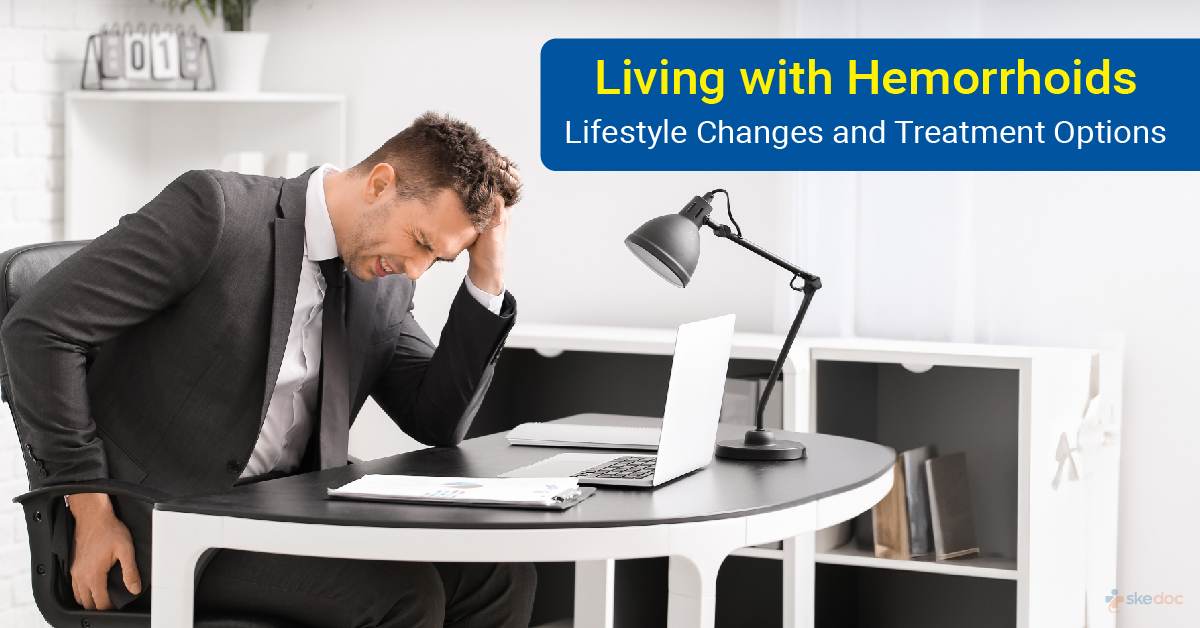Allergy
Blood Diseases
Bone & Joints
Brain
Cancer
Child Care
Cosmetic Surgery
Diabetes
Endocrinology
ENT
Eye
Gen Medicine
General Surgery
Heart
Kidney
Lifestyle
Liver & Digestive
Lung
Men’s Health
Mental health
Physiotherapy
Rheumatology
Skin and hair
Sleep Disorders
Spine
Transplant
Women Health
Thyroid
Vascular Surgery
Living with Hemorrhoids:Tips for Managing Symptoms

Piles or Hemorrhoids cause extreme pain and discomfort near the anus. These are structures that can be described as enlarged blood vessels either inside the rectum or near the anal canal. Piles can cause major disruption to everyday lifestyle as it becomes uncomfortable to pass stool, and sitting usually can be bothersome.
This article discusses various steps one can take to reduce pain and suffering due to chronic Hemorrhoids.
Mindful Eating and Dietary Changes:
There is a high correlation between chronic constipation and the formation of Hemorrhoids. Therefore, it is essential to modify the diet to reduce the incidence of constipation and include foods with high fiber content.
Some Indian foods that are rich in fiber are as follows:
- Legumes include beans, soybeans, peanuts, chickpeas, lentils, and dals.
- Whole grains such as brown rice and unrefined - rolled, or steel-cut oats.
- Vegetables contain high amounts of insoluble fibers like cabbage, cauliflower, sprouts, and broccoli.
Monitoring Water Intake
Dehydration is closely linked to the formation of hard stool. Passing hard stools can cause excessive strain in the anal canal and rupture the blood vessels leading to Hemorrhoid formation.
It is recommended that at least two to three liters of water be consumed daily, generally up to eight to ten cups.
Regular bowel passage:
In most cases, passing stools becomes extremely uncomfortable and painful. Following a healthy bowel schedule prevents constipation.
Hygiene Protocol
- As the general area around the anus becomes sensitive to touch, it can be challenging to clean and maintain hygiene in the anal region.
- It is essential that aggressive rubbing or cleaning will only aggravate and further inflame the anal region.
- It is best to use wet wipes rather than dry towels to clean after defecation. Drying off the area afterward prevents external infection.
- Sitz baths can provide immediate relief in the perianal region. Warm water is drawn into a large bowl. You can rest your bottom in the bowl, which relaxes the sphincter, reducing pressure and relieving pain.
Over the Counter Medications
- Various medicines can be applied over piles to ensure relief for some time before surgical intervention.
- Topical Creams and lotions containing steroids can reduce irritation and inflammation. These are applied over the hemorrhoids to provide temporary relief.
- A suppository is a substance that can be inserted into the rectum that slowly releases medicine to heal internal Hemorrhoids.
- Apart from topical applications, prescriptions for pain relief, medicines to reduce inflammation, and laxatives to soften stools can be taken.
Surgical Intervention for Hemorrhoids:
If the Hemorrhoids heal and go away on their own or can be bearable with lifestyle changes, surgery is not indicated. However, if these enlarged blood vessels bleed and are painful, leading them to thicken or become swollen, surgical management becomes the only possible way to get relief and prevent recurrence.
Rubber Band Ligation or Hemorrhoid Stapling
- This type of treatment relies on cutting the blood vessel with constant pressure from ligation or placing staples.
- A Proctologist tightly ties off the outgrowths with tightly bound elastics or staples, leading to the falling off of Hemorrhoids within a week.
- Rubber band ligament or hemorrhoid stapling can be done as an outpatient procedure.
- One thing to note with this approach is that these treatment plans are possible only with the type of hemorrhoids that can be isolated and have a narrow base.
- Excessive bleeding after the procedure can be a possible complication.
Laser Procedure
- Laser works in a way that generates heat. This leads to coagulation of blood vessels. Therefore, lasers melt and burn off the problematic Hemorrhoid tissue.
- This is one of the most common and widely used methods by proctologists to treat chronic Hemorrhoids.
- However, it can damage the surrounding healthy tissue when not done carefully.
Sclerotherapy
- For Sclerotherapy treatment of Hemorrhoids, chemicals can be injected into the tissue.
- This chemical is usually a zinc chloride mixture with other drugs.
- This works to cause the Hemorrhoid to shrivel and shrink.
- One main negative point of this method can be a recurrence of piles post-operation.
Hemorrhoidectomy
- If there is a recurrence of Hemorrhoids with minor surgeries like lasers and ligations, Proctologists recommend getting a Hemorrhoidectomy to cut and remove Hemorrhoid from its base altogether.
- This surgical approach treats complex and multiple Hemorrhoids that can be present internally and externally.
- Hemorrhoidectomy is usually done under general anesthesia.
- It can be either an open or closed technique based on the severity.
- Traction is first applied to the anal margin to insert forceps into the base of hemorrhoids.
- The isolated tissue is cut using a scalpel or Laser.
- This procedure is repeated for each Hemorrhoid, and a tiny margin of healthy tissue is removed during this surgery.
- This is to ensure that secondary piles are not formed.
- Hemorrhoidectomy offers a long-term solution to pain and manages discomfort.
- Compared to minor surgeries described above, one disadvantage is the longer recovery time necessary for the Hemorrhoidectomy procedure.
Summary:
Although piles are common among men, they can be difficult to deal with without proper medical guidance. Getting an evaluation to understand various treatment options can be beneficial for long-term relief and improved quality of life. It is important not to ignore Hemorrhoids, as they may lead to potential complications in the future.
Was this article helpful?
YesNo
Comments





